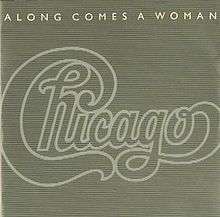Along Comes a Woman
| "Along Comes a Woman" | ||||
|---|---|---|---|---|
 | ||||
| Single by Chicago | ||||
| from the album Chicago 17 | ||||
| B-side | "We Can Stop The Hurtin'"[1] | |||
| Released | February 1985 | |||
| Format | 7" | |||
| Genre | Rock | |||
| Length |
4:14 (album version)[2] 3:47 (single version)[3] | |||
| Label | Full Moon/Warner Bros.[3] | |||
| Songwriter(s) | Peter Cetera, Mark Goldenberg[3] | |||
| Producer(s) | David Foster[3] | |||
| Chicago singles chronology | ||||
| ||||
"Along Comes a Woman" is a song written by Peter Cetera and Mark Goldenberg[4] for the group Chicago and recorded for their album Chicago 17 (1984), with Cetera singing lead vocals. The fourth single released from that album,[5] it reached a peak of number fourteen on the U.S. Billboard Hot 100 chart.[6]
Upon its release in 1985, Billboard magazine highlighted the single in its "Singles: Pop: Picks" section, as a "new release with the greatest chart potential," and called it a "hard rocker."[3] At the end of the year, Billboard magazine music critic, Linda Moleski, listed the single among her top ten highlights of the year as, “An excellent funk-pop sound that’s reflective of 1985.”[7]
The original album version was 4:14 in length.[2] It was remixed to a much more high-tech mid-80's sound for the single release which runs 3:47 in length.[3]
Music Video
The music video, shot in black and white, combined themes from the films, Raiders of the Lost Ark and Casablanca,[8][9] and featured Peter Cetera, the lead vocalist on the song, in the Indiana Jones/Rick Blaine-type role.[10] It was produced by Jon Small of Picture Vision, Inc., and was directed by Jay Dubin,[8] who also directed the syndicated TV series, The Wombles, in the 1980s.[11][12] The video was released in 1985, during what some call the "golden era" of MTV.[13]
References
- ↑ "Chicago - Along Comes A Woman". 45cat. 45cat website. Retrieved July 27, 2017.
- 1 2 Chicago (1984). Chicago 17 (vinyl LP record). U.S.A.: Warner Bros. Records, Inc. 25060-1.
- 1 2 3 4 5 6 "Singles: Pop: Picks". Billboard. Vol. 97 no. 9. USA: Billboard Publications, Inc. March 2, 1985. p. 75. Retrieved July 27, 2017 – via Google Books.
- ↑ Pollock, Bruce (1986). Popular music: an annotated index of American popular songs, Volume 10. Gale Research Co. p. 24. Retrieved 2012-01-04.
- ↑ Grein, Paul (February 23, 1985). "Chart Beat: Fast Facts". Billboard. Vol. 97 no. 8. USA: Billboard Publications, Inc. p. 6. Retrieved July 27, 2017 – via Google Books.
- ↑ "Chicago 17 - Chicago". billboard.com. Retrieved 2013-01-04.
- ↑ "The Critics’ Choice: Top 10 Disks, Videos, Shows". Billboard. Vol. 97 no. 52. USA: Billboard Publications, Inc. December 28, 1985. p. T34, T48. Retrieved July 27, 2017 – via Google Books.
- 1 2 Dupler, Steven (April 6, 1985). "Video Track: New York". Billboard. Vol. 97 no. 14. USA: Billboard Publications, Inc. p. 40. Retrieved July 27, 2017 – via Google Books.
- ↑ Burns, Gary (1994-12-01). "Formula and distinctiveness in movie‐based music videos". Popular Music and Society. 18 (4): 7–17. ISSN 0300-7766. doi:10.1080/03007769408591569.
- ↑ Pell, Nicholas (December 8, 2015). "Unpopular Opinion: Chicago, the Kings of Soft Rock, Are Awesome". L.A. Weekly. LA Weekly, LP. Retrieved July 27, 2017.
- ↑ Zuckerman, Faye (January 26, 1985). "Video Track: New York". Billboard. Vol. 97 no. 4. USA: Billboard Publications, Inc. p. 40. Retrieved July 27, 2017 – via Google Books.
- ↑ Dupler, Steve (December 21, 1985). "Dubin Speaks His Mind on Industry Woes". Billboard. Vol. 97 no. 51. USA: Billboard Publications, Inc. pp. 23, 24. Retrieved July 27, 2017 – via Google Books.
- ↑ Chiu, David (May 2, 2013). "MTV's original VJs reminisce about the network's golden era". CBS News. CBS Interactive Inc. Retrieved July 27, 2017.